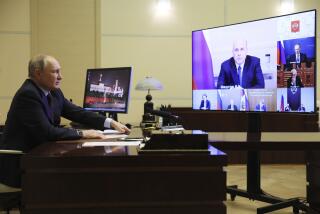Gorbachev Defeated on Strike Ban : Supreme Soviet Rejects Plea, Imposes Selective Prohibition
- Share via
MOSCOW — Lawmakers today handed President Mikhail S. Gorbachev a rare defeat, rejecting his plea for an emergency ban on strikes that he warns could destroy the ravaged Soviet economy.
The Soviet legislature instead imposed a selective ban on strikes in key economic areas.
Gorbachev said that he is satisfied with the compromise and that it will “help restore a normal life.”
“This is a decision in support of perestroika, “ he said.
A day after hearing Gorbachev’s proposal to ban all strikes for the next 15 months, a joint session of the Supreme Soviet’s two chambers spent all of today in confused debate before arriving at a weakened version.
In the end, it approved by a vote of 364 to 6 a temporary ban on strikes in the industries of transport, energy, metallurgy and all raw materials until it can approve full legislation governing strikes.
A detailed law regulating strikes may be ready as soon as next week.
A draft law bans strikes that could threaten the lives or health of people, and also in transportation, communications, energy, defense industries and government organs. However, many of the key issues in the draft have not yet been approved.
Gorbachev repeated his warning that the Soviet economy is threatened by waves of politically motivated job actions, but he did not call again for an outright ban on all strikes.
Deputies included in their decision language that would allow the country’s ministries of interior, defense and transport to take over railroads in Armenia and Azerbaijan if necessary to get rail traffic moving again to Armenia.
Earlier, during a break in the debate, Interior Minister Vadim V. Bakatin called the proposed strike ban unconstitutional.
“We don’t have a basis for deciding what is an extraordinary situation,” he said.
Leonid Abalkin, a deputy premier in charge of economic reform, said the initiative to change the draft resolution came during an overnight meeting of deputies and not from Gorbachev.
Gorbachev, in calling for a ban on strikes, called the measure necessary “to protect democratization from anarchy and irresponsible management.”
By inserting the threat to take over operations and security on the country’s railroads, the legislators were acting to bring an end to a blockade by Azerbaijanis of rail lines leading from their republic into Armenia.
Soviet law does not ban strikes outright. But labor unrest was ruthlessly repressed before Gorbachev came to power in 1985 and began his effort to turn the Soviet Union into a country ruled by law instead of dictate.
The most damaging strike this year was a walkout in July by thousands of coal miners in the far north, Siberia, and the Don Basin of the eastern Ukraine. That strike cost the country millions of rubles, and the government agreed to a package of economic and social improvements that officials said will cost about $3 billion.
More to Read
Sign up for Essential California
The most important California stories and recommendations in your inbox every morning.
You may occasionally receive promotional content from the Los Angeles Times.












